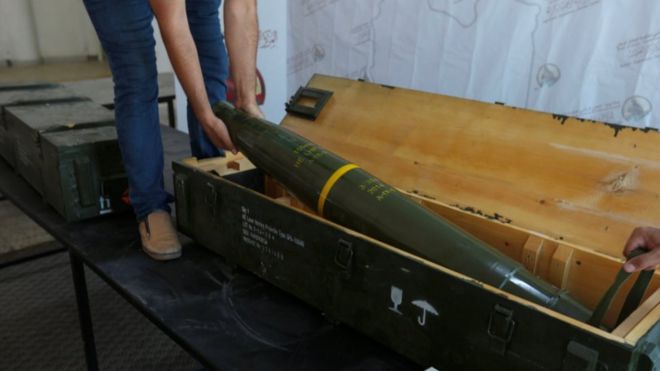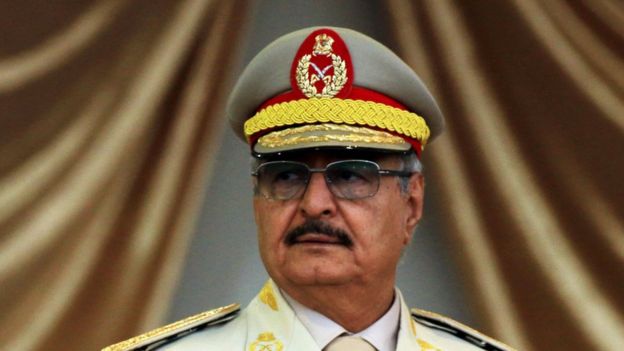 |
| The missiles were found by soldiers of the UN-backed government |
France has denied breaching a UN arms embargo after four of its anti-tank missiles were found on a base loyal to a rogue Libyan general.
The country's defence ministry says the "unusable" US-made Javelin missiles were never intended to be passed to any group, and were due to be destroyed.
However, they were discovered in a camp south of the capital Tripoli, used by forces loyal to General Khalifa Haftar.
Gen Haftar's forces are currently fighting for control of the city.
The battle for Tripoli - home of the internationally recognised government - began when Gen Haftar's forces launched an attack in April, with hundreds killed in the months since.
Libyan commander, Haftar back in Benghazi after medical treatment
Libya: Benghazi mosque bombing leaves one dead, over 30 wounded
Libya: Benghazi mosque bombing kills two, wounds 55 - medics
Libya migrants: Emergency evacuation operation agreed
The four missiles were discovered in June when forces loyal to the UN-backed government overran the camp, prompting an investigation in Washington.
France admitted the weapons - which can be used against tanks and other vehicles - belonged to them in a statement on Wednesday.
"These weapons were for the protection of forces undertaking intelligence and counter-terror missions," the defence ministry statement said.
It added the missiles were "damaged and unusable" and "being temporarily stocked at a depot ahead of their destruction".
France has always denied arming Gen Haftar's forces, but has offered diplomatic support.
Why is there war in Libya?
Libya has been torn by violence and division since long-time ruler Muammar Gaddafi was deposed and killed in 2011.
No authority has full control over Libya and the country is extremely unstable, torn between several political and military factions, the two most important of which are the UN-backed Government of National Accord (GNA), led by Prime Minister Fayez Mustafa al-Sarraj, and Gen Haftar's Libyan National Army (LNA), based in the eastern cities of Benghazi and Tobruk.
The general has been active in Libyan politics for more than four decades and was one of Gadaffi's close allies until a dispute in the late 1980s forced him to live in exile in the US.
Who is backing who?
Both the LNA and GNA have international backers.
Gen Haftar's LNA has long had the support of Egypt and the UAE, but now also counts Russia and Saudi Arabia among his backers.


At one point - when it looked like he would take Tripoli with ease - US President Donald Trump called and offered his congratulations. However, this relationship seems to have cooled in the months since.
Meanwhile, the GNA has its own supporters, including Turkey and Qatar.
Most Western nations back the unity government. Since the offensive on Tripoli, the UN, the US and the EU have all called for an immediate halt to the fighting and for talks.
France has technically taken a mediation role in the conflict. However, there are suspicions they back Gen Haftar.
 |
| General Khalifa Haftar leads the Libyan National Army (LNA) |
President Emmanuel Macron was the first Western leader to invite him to Europe for peace talks, and France launched air strikes in support of Gen Haftar's forces in February. They targeted Chadian opposition forces fighting against the LNA in the south.
Analysts suggest France's backing for Gen Haftar is related to fighting militants who threaten the wider region, potentially further boosted by an interest in oil.
Source: BBCNews

No comments:
Post a Comment
Add a Comment...